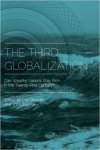Book Review: The Third Globalization: Can Wealthy Nations Stay Rich in the Twenty-First Century?
 The Third Globalization: Can Wealthy Nations Stay Rich in the Twenty-First Century? Edited by Dan Breznitz, John Zysman . Oxford, UK and New York: Oxford University Press, 2013. 432 pp. ISBN 978-0199917822, $105 (Cloth); ISBN 978-0199917846, $39.95 (Paperback).
The Third Globalization: Can Wealthy Nations Stay Rich in the Twenty-First Century? Edited by Dan Breznitz, John Zysman . Oxford, UK and New York: Oxford University Press, 2013. 432 pp. ISBN 978-0199917822, $105 (Cloth); ISBN 978-0199917846, $39.95 (Paperback).
Hiram Samel of the University of Oxford recently took the time to review the book in the October Issue of ILR Review.
From the review:
A marked lack of sustainable economic growth has become an unfortunate but predominant characteristic of wealthy nations in the seven years following the
financial crisis. Whether policymakers pursue fiscal stimulus or austerity, the outcome has been far from satisfactory. Notwithstanding Carmen Reinhart and Kenneth Rogoff’s argument that financial crises require a longer recovery time, is it possible that policymakers have the mix of policies wrong? The vast majority of wealthy states, after all, liberalized markets in the past two decades with the hope of emulating U.S. innovation and growth only to find instead they needed to reinsert themselves when capital and labor markets stalled. Given this failure, how prepared will the same states be for the next era of global competition, when emerging economies such as China and India that have benefited from rapid technological advances begin to leverage their economic and intellectual scale?
The authors of The Third Globalization address this question with a series of essays framed around a dilemma the editors, Dan Breznitz and John Zysman, term the “double bind.” In psychiatry, individuals face a double bind when they are unable to decide between conflicting statements from highly valued but distinct actors. In adapting the concept to political economy, the editors argue that politicians and policymakers in wealthy nations face similar indecision. On one hand, they need free markets to stimulate innovation and growth while, on the other hand, they need to reassert control of markets to foster social stability. The question is, can they do both at the same time?
You can read the rest of the review from ILR Review for free for the next two weeks by clicking here. Like what you read? Click here to sign up for e-alerts and have all the latest research and reviews like this sent directly to your inbox!































































































